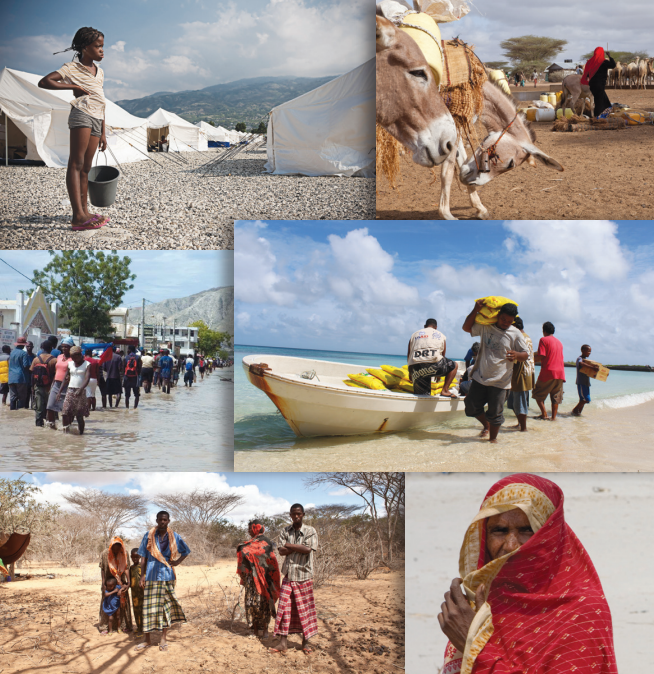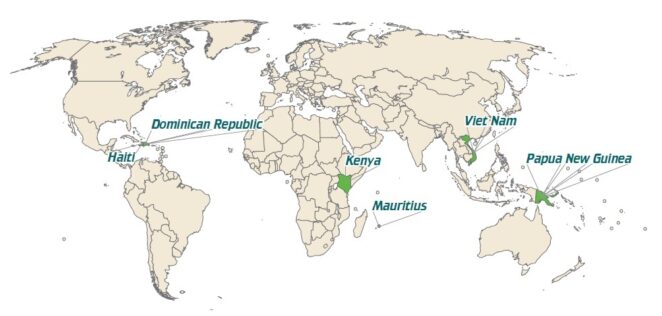Migration, Environment and Climate Change: Evidence for Policy (MECLEP)

Introduction
Environmental change is one of the major concerns for the international community. Although precise estimates are unavailable, it is commonly understood that due to changes in the environment, more and more people will migrate in coming years, in particular within and between developing countries. At the same time, migration will most likely have a growing impact on the environment. For example, internal migration to cities is expected to continue to increase. Today, over half of the world’s population lives in urban areas, many of which are in coastal areas and are particularly vulnerable to sea level rise. The effects of these changes will vary and the impact will differ between each region of the world.
Despite a growing body of studies on the topic of migration, environment and climate change, there is still a lack of reliable data and policy oriented research which can respond to the increasing demand and reflect the needs of policymakers.
The Migration, Environment and Climate Change: Evidence for Policy (MECLEP)project aims to contribute to the global knowledge base on the relationship between migration and environmental change, including climate change. The innovative research will aim to formulate policy options on how migration can benefit adaptation strategies to environmental and climate change.
The MECLEP project therefore fills an important gap as it is a policy oriented programme of work based on three main components of activities.
Project Location
The 6 project countries are Dominican Republic, Haiti, Kenya, Mauritius, Papua New Guinea and Viet Nam.

Project Activities
Research
- Strengthen knowledge- and information-sharing with new evidence
- Explore how migration can contribute to adaptation strategies in diverse settings
- Conceptual terminology assessment
- National country-level assessments and household-level surveys
- Final comparative report with migration-and-environment scenario building
- Local researcher capacity-building workshops
- Global online information-sharing platform
Capacity-building
- Enhance government capacity to take action on environmental migration
- Training manual on migration, environment and climate change
- Training workshops in the 6 pilot countries
Dialogue
- Facilitate policy coherence and cooperation nationally and regionally
- National level technical working groups
- National policy consultations
Project outputs
Migration, Environment and Climate Change Policy Brief Series articles
- Migration as adaptation? A comparative analysis of policy frameworks
- When do households benefit from migration? Insights from vulnerable environments in Haiti
- Relocation as an adaptation strategy to environmental stress: Lessons from the Mekong River Delta
- Assessing the Evidence: Migration, Environment and Climate Change in Papua New Guinea
- Defis, Enjeux et Politiques: Migrations, Environnement et Changements Climatiques en Haiti
- Diagnóstico de Informaciones para Políticas Públicas: Migración, Medioambiente y Cambio Climático en la República Dominicana
Check back regularly for more outputs!
Project details
Duration: Three years (January 2014 – December 2016)
Estimated budget: 2.4 million Euros
EUR 1.9 million of the budget is funded by the European Union under the Thematic Programme on Migration and Asylum (TPMA).
The project is implemented by IOM through a consortium of six research partners:
University of Versailles Saint-Quentin,
France
Bielefeld University,
Germany
Center for Ethnic and Migration Studies (CEDEM), University of Liège,
Belgium
Research Center on Citizenship, Migration and the City (CIMIC), Erasmus University Rotterdam,
The Netherlands
Facultad Latinoamericana de Ciencias Sociales (FLACSO),
Costa Rica
Institute for the Environment and Human Security (UNU-EHS), United Nations University,
Germany
Associates
Centro de Investigaciones y Estudios Sociales (CIES), Iberoamerican University,
Dominican Republic
Research Institute for Climate Change, Can Tho University, DRAGON Institute, Mekong,
Viet Nam
Institute of Geography, University of Neuchâtel,
Switzerland
Related resources
- Read about MECLEP on the Environmental Migration Portal
- Go to the Environmental Migration Portal: Knowledge Platform on People on the Move in a Changing Climate
- View/download the MECLEP project leaflet [English]
- View/download the MECLEP project leaflet [Spanish]
- View/download the MECLEP project leaflet [French]
(0) Comments
There is no content